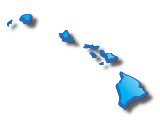Hawaii Rebates and Incentives Summary

Hawaii, land of volcanoes, waterfalls and immense beauty, is taking steps to become the most energy-independent state in the U.S. through an ambitious partnership with the Department of Energy (DOE). Under the partnership, DOE and Hawaii established the Hawaii Clean Energy Initiative. And it couldn’t have come at a better time. Since Hawaii traditionally has relied on expensive diesel imports to generate electricity, it has the highest electric costs in the U.S. In fact, in 2012 it became the first state to reach parity with solar. Through the initiative and other incentives like tax credits, a feed-in tariff, existing net-metering program, and low-interest loan programs, Hawaii is helping its residents make the transition to solar and its renewable cousins. The state also offers rebates for solar hot water systems.
Under the clean energy initiative, DOE will help Hawaii’s smaller islands transition to 100 percent renewables by 2030. Across all the islands Hawaii will attempt to drastically reduce its consumption of petroleum—by about 72 percent—and plans to have 40 percent of its energy coming from renewable resources like solar, wind and ocean power by 2030.
The state still has a long way to go. As of 2010, 90 percent of the island state’s energy comes from petroleum, with three quarters of the state’s energy being generated by primarily petroleum power-plants, according to the DOE’s Energy Information Administration. While coal powers most of the United States, transporting coal to Hawaii via ship, would likely be prohibitively expensive, compared to shipping petroleum to the state.
The state already is a leader in the nation when it comes to solar-water heaters. As of 2010 the state already had 80,000 solar water heaters installed. And, thanks to the 2008 Solar Roofs Act, most new homes in the state are required to have solar water heaters as well.
Given Hawaii’s subtropical environment with mild year-round temperatures, energy use is lower in the state than in most other states. And because of its location in the Pacific, the state has vast potential for different types of renewable energy, including solar, geothermal (it is built on volcanoes after all), wind, and ocean power.
(As of October 2012)
, full_html